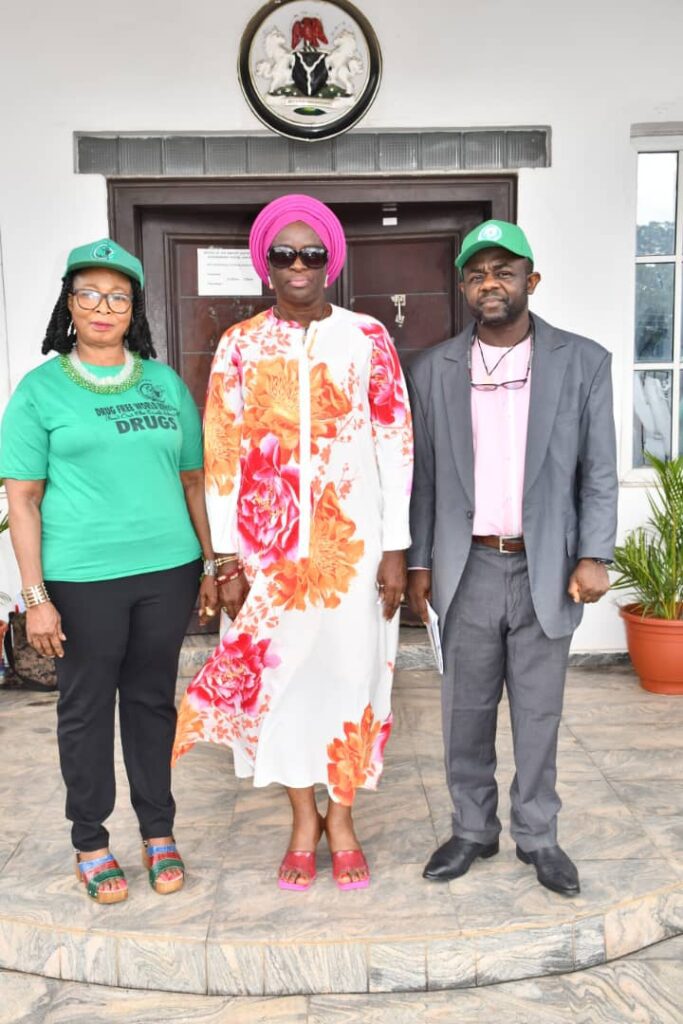A Non-Governmental Organization (NGO), Drug Free World Africa (DFWA) has proposed an adoption of a public health literacy model derived from African traditional knowledge and ethics to fight substance abuse and drug addiction in Nigeria and Africa.
The proposal was made during a courtesy visit of the organization to the Deputy Governor of Imo State, Lady Chinyere Ekomaru.
The DFWA partners with National Drug Law Enforcement Agency (NDLEA), and researchers from the Imo State University, in a bid to curb drug and substance abuse.
According to the leader of the group, Professor Yongabi, a fellow of the African Institute of Public Health Professional and Fellow of the Public Health Practitioner Council of Nigeria, the epidemic of substance abuse and drug addiction is rising at an unprecedented rate in Africa, with far-reaching consequences for the society.
Yongabi outlined the health effects of opioid , tramadol and cannabinoids from the plant cannabis sativa.
He posited that these plants were created for medicinal uses but over the years the phytochemicals have been abused.
He emphasized that the problem is not only a mental health issue but also a socioeconomic one, fueled by poverty and lack of basic needs.
“Drawing from the Nairobi Declaration of 1998 where health literacy was redefined by World Health Organization (WHO), incorporating the socioeconomic determinants, the drug addiction and abuse in Nigeria and Africa at large is propelled by poverty and lack of basic needs but while in the western society it is not predicted on poverty but by mental health related challenges.”
“The epidemiological picture of substance abuse in Nigeria and Africa is rising at an unprecedented proportions and may be incurable like cancer and AIDs,” Yongabi noted.
He proposed a four-pillar model for addressing the issue, which includes access to knowledge about the dangers of substance abuse, understanding the consequences of drug use, using the knowledge effectively, and benefiting from it.
He emphasized the importance of mainstreaming African indigenous knowledge systems into the model to make it more effective.
“The third pillar underpins the use of the knowledge effectively and the fourth pillar is the positive health outcome as a result of having access to the knowledge, understanding the knowledge, use of the knowledge and benefiting from the knowledge.”
“This particular pillar and for the first time addressing drug addiction and substance abuse, the African indigenous knowledge system will be mainstreamed into these four pillars of health literacy so that we can actually have an effective Drug Free Nigeria,” the University Don stated.
Yongabi also highlighted the need for a multidimensional approach to tackle the problem, involving policy makers, young people, adolescents, parents, and government officials.
He urged the Imo State Government through the Deputy Governor to adopt the health literacy model as a policy and roll out capacity building programs for all stakeholders.
“We are requesting the mother of our state; your children should not perish due to lack of Knowledge. Your children are drinking ‘Gutter Juice’ which is a blend of old abused drugs (Cocaine, Marijuana, Crystal Methamphetamine and so on) with their new findings like coke in urine, used sanitary pads soaked in water and so on.”
“Education –‘Drug Abuse Free Literacy’ is the key. Lack of this form of education makes them weak and vulnerable to drug abuse.”
“‘Prevention Is Always Better Than Cure’
Your Excellency, assuming we can’t get a total drug abuse free State, our children in schools Primary, Secondary and even tertiary are crying out for our motherly/parental intervention. Let all not run amok. Drug Free World Africa is reaching out on this tour as major target plans.”
“We therefore solicit your support/partnership on this project. Help us expand our reach and impact across the State. Take it as your Personal Passionate Pet Project (PPPP- P4).
“Drug Free World Africa (DFWA) will run it to your pride in the state. We believe that, this project, if taking and done well, your name will be engraved in every child’s heart, their prayers will lead you
father and protect you now and ever,” he appealed.
Professor Yongabi also highlighted that 60% of Nigeria’s population is made up of adolescents and youth, who are most vulnerable to drug abuse. He urged the government to adopt a clear distinction between medicine and drugs, emphasizing that many people confuse these terms.
He emphasized the need to address new substances that have not been widely known but are being used by young people at local levels, which can lead to addiction and psychopathic effects.
Also speaking, the country representative of Drug Free World Africa, Dr Lina Okereke, highlighted the achievements of the organization and prayed that the Imo State Government should throw their weight on the efforts and achievements gained thus far.
Reacting, the Deputy Governor commended the efforts of DFWA and acknowledged the gravity of the problem, emphasizing that it is everyone’s responsibility to fight against drug abuse. She pledged to work with the team and Imo State University researchers to proffer a drug-free state.
“Substance addiction has been the cause of the incessant insecurities in the state and the country at large . The fight against drug abuse is everyone’s contribution as the perpetrators come from families and that parents and pharmacies are all part of the solution.”
“Our administrator has so far trying tirelessly to uplift the welfare of the citizens of the state and we promise to work with Drug Free World Africa and Imo State University researchers to proffer a drug free state.” Ekomaru promised.
The team stressed that education is key in preventing drug abuse and promoting a healthy lifestyle. They appealed to parents and government officials to take responsibility in creating awareness and providing support for those affected by substance abuse.

